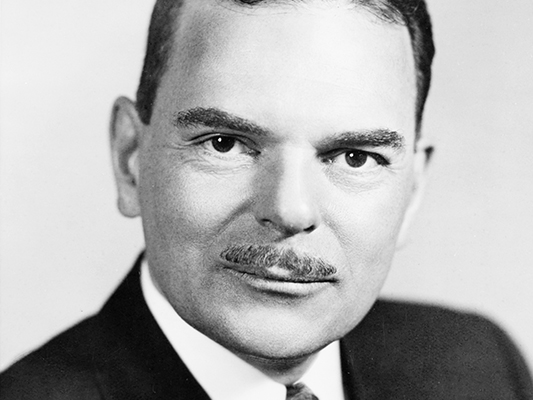Thomas Dewey

Born: March 24, 1902, Owosso, Michigan
Died: March 16, 1971, Miami, Florida
Nicknames: Gangbuster
Associations: Lucky Luciano, Dutch Schultz, Waxey Gordon, Prohibition, U.S. Justice Department, New York District Attorney, New York Governor
Thomas Dewey was one of the great leaders in the 20th century’s epic battle between American law enforcement and the Mob. Dewey first grabbed headlines as a special prosecutor for the Justice Department going after bootleggers and racketeers in New York City. In the early 1930s, Dewey won successful prosecutions against big-name bootleggers such as Waxey Gordon.
In 1935, Dewey was appointed by the New York governor as a special prosecutor for the County of New York – that is, Manhattan – where Dewey wouldn’t have the income tax statutes to work with, but he could enforce state laws against gambling and prostitution. The appointment was specifically in response to concerns from the community that racketeers and gangsters were not being effectively or aggressively pursued by the city’s existing law enforcement.
One of Dewey’s first targets was Dutch Schultz, who was known for his illegal gambling and prostitution rings. Schultz didn’t like Dewey, and found that his investigations made it hard for him to make money. Schultz asked the leader of the nation’s organized crime Commission, Charles “Lucky” Luciano, to approve a hit on Dewey, but Luciano said no. Killing a public official would be bad for business.
When Schultz decided to buck Luciano and go through with the hit, Luciano orchestrated the death of Schultz, effectively saving Dewey’s life. With Schultz out of the way, Dewey was free to focus on other crime lords in New York City. He focused first on Louis Lepke, head of the so-called Murder Incorporated assassination-for-hire enterprise, who served as Luciano’s enforcer. Dewey put Lepke away for murder, and Lepke eventually went to the electric chair.
Then Dewey, along with his assistant, a young African-American woman lawyer named Eunice Carter, built his case against Luciano through evidence that prostitutes from all over New York were represented by the same lawyers and bail bondsmen who worked for Luciano. With Carter’s help, Dewey sent Luciano “up the river” to Sing Sing prison for 30 to 50 years.
Between 1935 and 1937, Dewey won 72 convictions out of 73 prosecutions. His success against New York’s biggest mobsters gave him a huge political platform. He was elected district attorney for New York in 1937; he immediately launched an effort to win the governor’s seat in New York in 1938, but lost. He was successful in his second try, winning the governorship in 1942 and two more terms, serving until 1955.
As governor, he had one more bit of business with his old nemesis Lucky Luciano. During World War II, Luciano struck a deal with federal officials to protect the New York docks from German saboteurs in return for clemency. After the war, Dewey reluctantly agreed to free Luciano from prison if the gangster left the country – which he did, returning to his native Italy.
Dewey ran for president twice, and was widely expected to beat President Harry S. Truman in 1948. One Chicago Tribune headline famously and erroneously proclaimed, “Dewey Beats Truman.” But it did not happen.
Years later, in 1968, President Richard Nixon offered Dewey a spot on the U.S. Supreme Court, but Dewey declined it, citing his age. Dewey never reached the presidency, but he will always be celebrated as an honest and effective “gangbuster.”




